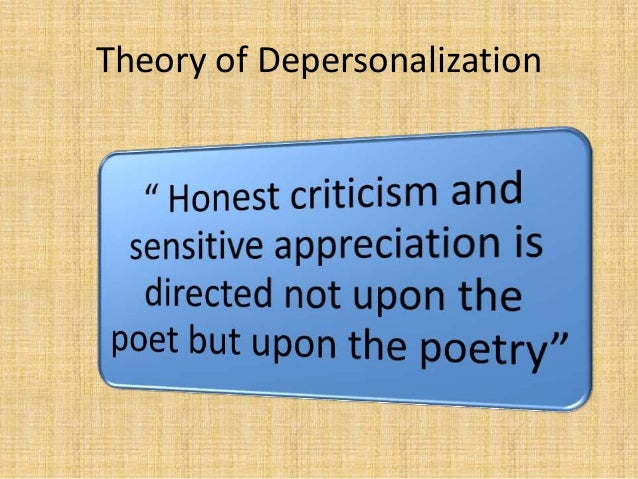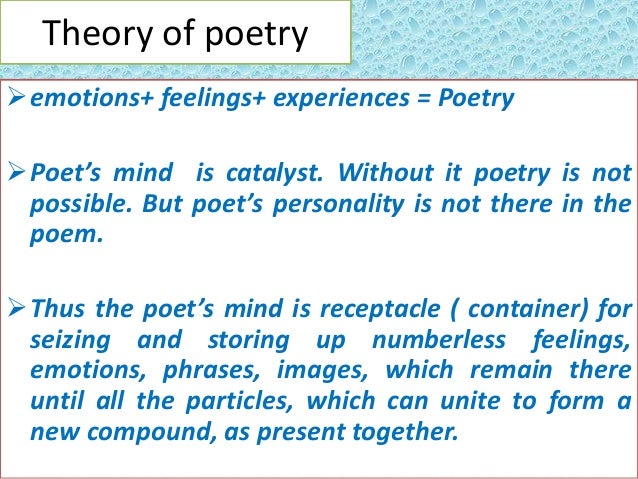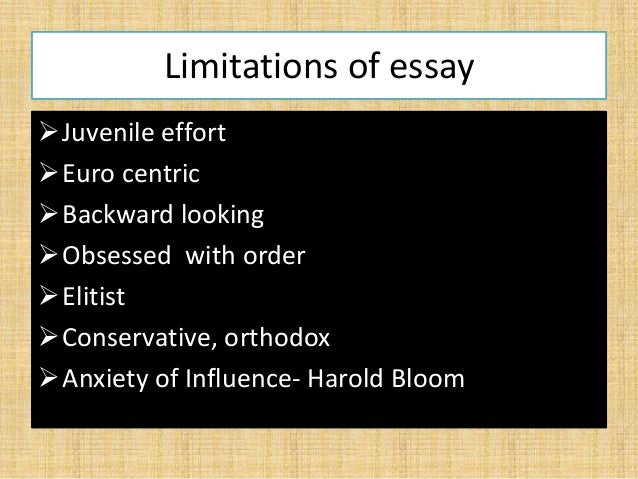"Tradition and Individual Talent" by T. S. Eliot
Eliot’s concept of tradition:-
First of all he begins with general sense, the dictionary meaning of tradition. He talks about the English society that they consider tradition in negative sense or sees this term derogatorily. It means that modern automatically means good and traditional means not so good. But it is not so. Eliot sees it in very positive sense. He says that tradition is not something which is dead but it is something which is already living. Tradition does not mean the blind adherence of the past or slavish imitation of the past. He criticizes Romantics with their great emphasis on individual. He says that writer should write with History in his bones. Eliot demands wide reading from the artist. So he says that writer should be aware about his as well as whole European literary tradition, and not merely imitate the tradition but fit in and contribute to the tradition. Eliot clearly says that tradition cannot be inherited, but acquired by labour. It means that if you born in that tradition it doesn’t mean that you have knowledge of that tradition but one has to work hard( labour and erudition) for the knowledge of that tradition. Yes, at some extent I agree with him about his concept of tradition at the same time I am not agree with his narrow concept of tradition.( that I will discuss in conclusion)
Historical sense-
Eliot talks about historical sense. He says that writer should have historical sense. Let us illustrate this by the following quotes “ the historical sense involves a perception, not only of the pastness of the past but of the presence” and “ this historical sense, which is a sense of a temporal and of timeless together, is what makes a writer traditional”. He says that historical sense helps a writer to understand what was in the past and among that what is living today? What are the relevance of that past at the present day? For example work created before many centuries are still existing today, so which are the elements in the book that it is still existing. Which are the universal appeals in that work?. All this knowledge will help the poet/writer to write his /her own work. Today’s popular writing may be died tomorrow, then how can an artist be immortal through his work? One can get his answer if he /she has a historical sense. If we study the past then we will find the Love and Death has universal appeal, And this elements we find again and again in any work. He talks about pastness of past- if we take an example from our Indian myth then it is not the Ram and Krishna was in the past but how Ram and Krishna are still alive today that is the pastness of past. It is temporal and timeless means Tradition never dies, it goes on.
Individual talent does not cut himself away from the tradition. Tradition for Eliot is an already an existing monument and the individual can only marginally add a bit, extend a bit. According to Eliot Individual is adding a brick in the minarates. Tradition is not dead but a living thing and every new artist extends a bit in the tradition. And individual makes his /her own place in the long history called tradition. At this time he is criticizing the Romantics because of their great deal of emphasis on individual. So Eliot was carrying a thread forward from Matthew Arnold that no individual has sense of his own, One has to compare with the best that is available. Thus Eliot explains the interdependence of the tradition and individual talent.
"Some can absorb knowledge, the more tardy must sweat for it. Shakespeare acquire essential history from Plutarch than most men could from the whole British museum."
T.S.Eliot demands wide reading from the poet as well as from his readers because he himself was the very scholar, highly intellectual and well read person.( Nobel Prize winner!!!!!!) he says that everyone should be well read but what he finds is Shakespeare is an exceptional. If we study Shakespeare’s biography then we will find that there is no mention that Shakespeare went to any university. And dr. Samuel Jonson also says that it seems that Shakespeare was not knowing any other language than English. But then even his works, characters, theme has universal appeal. So what Eliot anticipated is that some body will question him that you are telling that poet should be well read but Shakespeare is not fitting into the principle what you are giving, so he says that he is an exceptional. It seems that Shakespeare has absorbed the knowledge, lived through his age, not through the systematic learning. This is how he is a individual talent. If he (Eliot)can’t do like that then Shakespeare might have become true individual what Romantics were speaking about. So what he does, he says Shakespeare is an exceptional. So he says some can absorb knowledge, And others (tardy) must sweat it.
Honest criticism and sensitive should be directed upon the poetry , not upon the poet.


Earlier it was believed that to understand the work of art one must take help of biography of the author, its setting(time and place), history, etc. so what he says is that CLOSE READING OF TEXT is everything. If you want to get the meaning of the text study WORDS not the author. So he says honest criticism and sensitive appreciation directed not upon the poet but upon the poetry. If you like the poem then praise poetry, not the poet. Poet is not present in the poem. Eliot uses the words like ‘Surrendering’,’ sacrificing’ one’s own self. So poet is not important but the product poetry is important.
During the 20th century, science was predominating in every field. So Eliot takes help of scientific analogy to prove his point- the theory of depersonalization. He says that when Oxygen and Sulphur Dioxide are mixed in the presence of the Platinum, it forms the Sulphuric Acid. But the newly formed Sulphuric Acid have no traces of platinum. Similarly poet’s mind is the catalyst. Without it poetry cannot be created but when we read the poem it has not the personal emotions and feelings of the poet. So he says the more perfect the artist the more separate in him will be the man who suffers and the mind which creates.(for example…. We cannot find Shakespeare in any of his great works)(where is Shakespeare in his plays????) this is how he elaborates his theory of depersonalization. Like Arnold we can say Disinterestedness or Detachment.

Eliot discussed that poetry is not a turning loose of emotion, but an escape from emotion. It is not the expression of personality but an escape from personality. Means that when artist writes he does not write only about his feelings and emotions. Means poem is not expression of his own feeling, but an escape from that. We cannot find biographical elements in the poetry. Poetry is universal. Feelings, ideas, thoughts, experiences of the poet concretized and creates the poetry, which is not expression of himself.
Thus, T.S.Eliot puts a foundational brick for the New Criticism, which gives more stress to the CLOSE READING OF THE TEXT. Though this essay has many limitations that it is Elitist, conservative, orthodox, backward looking and Euro- centric

It seems that out side the Europe there was not tradition at all. He talks only about Homer means European literary tradition. And also not giving importance to the feminist literary tradition etc. and Harold Bloom also says it Anxiety of Influence- under the influence of the great writer it becomes difficult to write for new poet. It harms his individual ability.
This was my interpretation of this essay.
Thank you.
Eliot’s concept of tradition:-
First of all he begins with general sense, the dictionary meaning of tradition. He talks about the English society that they consider tradition in negative sense or sees this term derogatorily. It means that modern automatically means good and traditional means not so good. But it is not so. Eliot sees it in very positive sense. He says that tradition is not something which is dead but it is something which is already living. Tradition does not mean the blind adherence of the past or slavish imitation of the past. He criticizes Romantics with their great emphasis on individual. He says that writer should write with History in his bones. Eliot demands wide reading from the artist. So he says that writer should be aware about his as well as whole European literary tradition, and not merely imitate the tradition but fit in and contribute to the tradition. Eliot clearly says that tradition cannot be inherited, but acquired by labour. It means that if you born in that tradition it doesn’t mean that you have knowledge of that tradition but one has to work hard( labour and erudition) for the knowledge of that tradition. Yes, at some extent I agree with him about his concept of tradition at the same time I am not agree with his narrow concept of tradition.( that I will discuss in conclusion)
Historical sense-
Eliot talks about historical sense. He says that writer should have historical sense. Let us illustrate this by the following quotes “ the historical sense involves a perception, not only of the pastness of the past but of the presence” and “ this historical sense, which is a sense of a temporal and of timeless together, is what makes a writer traditional”. He says that historical sense helps a writer to understand what was in the past and among that what is living today? What are the relevance of that past at the present day? For example work created before many centuries are still existing today, so which are the elements in the book that it is still existing. Which are the universal appeals in that work?. All this knowledge will help the poet/writer to write his /her own work. Today’s popular writing may be died tomorrow, then how can an artist be immortal through his work? One can get his answer if he /she has a historical sense. If we study the past then we will find the Love and Death has universal appeal, And this elements we find again and again in any work. He talks about pastness of past- if we take an example from our Indian myth then it is not the Ram and Krishna was in the past but how Ram and Krishna are still alive today that is the pastness of past. It is temporal and timeless means Tradition never dies, it goes on.
- Relation between Tradition and Individual Talent -
Individual talent does not cut himself away from the tradition. Tradition for Eliot is an already an existing monument and the individual can only marginally add a bit, extend a bit. According to Eliot Individual is adding a brick in the minarates. Tradition is not dead but a living thing and every new artist extends a bit in the tradition. And individual makes his /her own place in the long history called tradition. At this time he is criticizing the Romantics because of their great deal of emphasis on individual. So Eliot was carrying a thread forward from Matthew Arnold that no individual has sense of his own, One has to compare with the best that is available. Thus Eliot explains the interdependence of the tradition and individual talent.
"Some can absorb knowledge, the more tardy must sweat for it. Shakespeare acquire essential history from Plutarch than most men could from the whole British museum."
T.S.Eliot demands wide reading from the poet as well as from his readers because he himself was the very scholar, highly intellectual and well read person.( Nobel Prize winner!!!!!!) he says that everyone should be well read but what he finds is Shakespeare is an exceptional. If we study Shakespeare’s biography then we will find that there is no mention that Shakespeare went to any university. And dr. Samuel Jonson also says that it seems that Shakespeare was not knowing any other language than English. But then even his works, characters, theme has universal appeal. So what Eliot anticipated is that some body will question him that you are telling that poet should be well read but Shakespeare is not fitting into the principle what you are giving, so he says that he is an exceptional. It seems that Shakespeare has absorbed the knowledge, lived through his age, not through the systematic learning. This is how he is a individual talent. If he (Eliot)can’t do like that then Shakespeare might have become true individual what Romantics were speaking about. So what he does, he says Shakespeare is an exceptional. So he says some can absorb knowledge, And others (tardy) must sweat it.
Honest criticism and sensitive should be directed upon the poetry , not upon the poet.


Earlier it was believed that to understand the work of art one must take help of biography of the author, its setting(time and place), history, etc. so what he says is that CLOSE READING OF TEXT is everything. If you want to get the meaning of the text study WORDS not the author. So he says honest criticism and sensitive appreciation directed not upon the poet but upon the poetry. If you like the poem then praise poetry, not the poet. Poet is not present in the poem. Eliot uses the words like ‘Surrendering’,’ sacrificing’ one’s own self. So poet is not important but the product poetry is important.
- Depersonalization-=
During the 20th century, science was predominating in every field. So Eliot takes help of scientific analogy to prove his point- the theory of depersonalization. He says that when Oxygen and Sulphur Dioxide are mixed in the presence of the Platinum, it forms the Sulphuric Acid. But the newly formed Sulphuric Acid have no traces of platinum. Similarly poet’s mind is the catalyst. Without it poetry cannot be created but when we read the poem it has not the personal emotions and feelings of the poet. So he says the more perfect the artist the more separate in him will be the man who suffers and the mind which creates.(for example…. We cannot find Shakespeare in any of his great works)(where is Shakespeare in his plays????) this is how he elaborates his theory of depersonalization. Like Arnold we can say Disinterestedness or Detachment.

Eliot discussed that poetry is not a turning loose of emotion, but an escape from emotion. It is not the expression of personality but an escape from personality. Means that when artist writes he does not write only about his feelings and emotions. Means poem is not expression of his own feeling, but an escape from that. We cannot find biographical elements in the poetry. Poetry is universal. Feelings, ideas, thoughts, experiences of the poet concretized and creates the poetry, which is not expression of himself.
Thus, T.S.Eliot puts a foundational brick for the New Criticism, which gives more stress to the CLOSE READING OF THE TEXT. Though this essay has many limitations that it is Elitist, conservative, orthodox, backward looking and Euro- centric

It seems that out side the Europe there was not tradition at all. He talks only about Homer means European literary tradition. And also not giving importance to the feminist literary tradition etc. and Harold Bloom also says it Anxiety of Influence- under the influence of the great writer it becomes difficult to write for new poet. It harms his individual ability.
This was my interpretation of this essay.
Thank you.
No comments:
Post a Comment